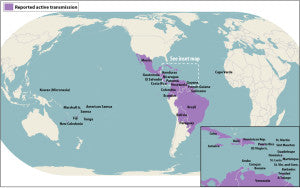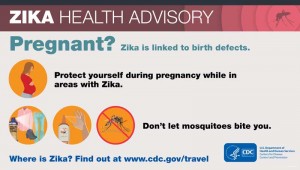On April 11, officials from the U.S. Centers for Disease Control and Prevention warned about the threat posed from the Zika virus.
"Everything we look at with this virus seems to be a bit scarier than we initially thought," said Dr. Anne Schuchat, a deputy director there.
Yet Americans don’t know that much about it. A poll taken by the Associated Press found forty percent of Americans had heard little or nothing about the Zika virus.
So, let’s learn about it.
Below are some of the questions from the poll. Think about them, then read a little more about what the experts say.
How much have you heard or read about the Zika virus?
[caption id="attachment_20399" align="alignright" width="300"]

Countries and territories with active Zika virus transmission as of April 13, 2016 - via CDC (click to enlarge)[/caption]
The Zika virus appeared for the first time in
1947 in Uganda. Until Recently, it was considered a localized, minor virus, especially when compared with other mosquito-borne diseases like malaria. Last year alone, 214 million people
contracted malaria and 438,000 died. Until 2007, scientists knew of 14 human cases, though
more unreported cases were likely. Zika appeared in Brazil in May 2015. It is spreading rapidly through the Americas, the Caribbean, and many Pacific islands. The World Health Organization declared the virus a Public Health Emergency on February 1, 2016.
The illness itself is fairly mild.
The Brazilian Health Ministry said 80% of people who catch it displayed no symptoms. According to the CDC, the most common symptoms are fever, rash, joint, and red eyes. people rarely get sick enough to go to the hospital and rarely die. What's the worry?
How worried are you that...
- The U.S. will see a large number of cases of the Zika virus in the next 12 months?
- You or someone in your family will be infected by the Zika virus?
- You or someone in your family will need to change travel plans to avoid the Zika virus?
The worry is threefold. First, the two mosquito species that transmit
Zika have been found in 30 states. Therefore, localized outbreaks could occur in many U.S. states, according to the director of the
U.S. National Institute of Allergy and Infectious Disease. In U.S. states, 358 cases have been reported, but only in people who traveled abroad. The virus has taken hold in the U.S. territories, however. Puerto Rico may already have hundreds of thousands of Zika infections,
a CDC director said.
As far as you know, can a person become infected with Zika virus from each of the following, or not?
- The bite of a mosquito carrying the virus
- Having sex with someone who is infected
- Casual contact, like shaking hands, with someone who is infected
Mosquito bites are not the only way to contract Zika, although they are the main way, according to the CDC. A pregnant woman can pass the virus to her unborn child. Men can pass the virus through sexual contact. The virus could also be transmitted through blood transfusion.
To the best of your knowledge, is the Zika virus linked to birth defects in babies born to infected mothers, is it not linked with birth defects, or have you not heard enough to say?
[caption id="attachment_20400" align="alignright" width="90"]

Microcephaly comparison - via CDC (click to enlarge)[/caption]
The second big concern about Zika is that it’s been shown to cause several severe disorders. It’s especially bad for pregnant women.
A study in the New England Journal of Medicine said ultrasounds found major abnormalities in 29 percent of fetuses of 88 pregnant women in Brazil who tested positive for Zika. Fetuses in women without Zika showed no abnormalities. Zika has been linked to
microcephaly, in which a baby’s skull and brain don’t properly develop.
According to a story in USA Today, Zika has been associated with Guilaine-Barre syndrome, when the immune system attacks the nervous system. Last week, scientists announced it was also linked to acute disseminated encephalomyelitis, swelling in the brain and spinal cord that affects the coating around nerve fibers.
To the best of your knowledge, is there…?
- An effective test to determine if an individual is currently infected with the Zika virus, is there not an effective test, or have you not heard enough to say?
- An effective medicine to treat people who have gotten sick with the Zika virus, is there not an effective medicine to treat people, or have you not heard enough to say?
- An effective vaccine to prevent people from becoming infected with the Zika virus, is there not an effective vaccine to prevent infections, or have you not heard enough to say?
The third major concern is there’s no way to treat Zika. Scientists have developed a test to determine if someone is infected with Zika, but it’s
not widely available.
There are no vaccines or medicines to treat Zika.
In response to reports of the Zika virus, have you or has someone in your household done any of the following or haven’t you done this?
-
[caption id="attachment_20403" align="alignright" width="300"]
 Zika Health Advisory - via CDC (click to enlarge)[/caption]
Removed sources of standing water from your yard or household that provide mosquito-breeding sites, such as tires, buckets, toys, or trash containers
Zika Health Advisory - via CDC (click to enlarge)[/caption]
Removed sources of standing water from your yard or household that provide mosquito-breeding sites, such as tires, buckets, toys, or trash containers
- Applied insect repellent when spending time outdoors
- Closed windows and used air conditioning or put screens in windows to keep mosquitoes outside
- Worn long-sleeved shirts and long pants to avoid being bitten by mosquitoes
- Changed past or future travel plans to areas affected by the Zika virus
- Avoided people you think may have recently visited areas affected by the Zika virus
The best way to protect yourself from Zika is to
protect yourself from mosquito bites.
Wear long sleeves and long pants. Stay in places with air conditioning or use window and door screens. Use
Environmental Protection Agency-registered insect repellent. Also, get rid of mosquito breeding sites like containers with standing water.
Use a condom correctly to keep from getting Zika though sex.
Right now,
experts don’t think Zika will be an epidemic in the U.S. because air conditioning and window and door screens are fairly widespread.
However, they think pockets of the virus are likely to break out, in more places than they had originally anticipated. So take care of yourself this mosquito season.
The original Associated Press
survey results are here.
 a Rafflecopter giveaway
a Rafflecopter giveaway
 Countries and territories with active Zika virus transmission as of April 13, 2016 - via CDC (click to enlarge)[/caption]
The Zika virus appeared for the first time in 1947 in Uganda. Until Recently, it was considered a localized, minor virus, especially when compared with other mosquito-borne diseases like malaria. Last year alone, 214 million people contracted malaria and 438,000 died. Until 2007, scientists knew of 14 human cases, though more unreported cases were likely. Zika appeared in Brazil in May 2015. It is spreading rapidly through the Americas, the Caribbean, and many Pacific islands. The World Health Organization declared the virus a Public Health Emergency on February 1, 2016.
The illness itself is fairly mild. The Brazilian Health Ministry said 80% of people who catch it displayed no symptoms. According to the CDC, the most common symptoms are fever, rash, joint, and red eyes. people rarely get sick enough to go to the hospital and rarely die. What's the worry?
How worried are you that...
Countries and territories with active Zika virus transmission as of April 13, 2016 - via CDC (click to enlarge)[/caption]
The Zika virus appeared for the first time in 1947 in Uganda. Until Recently, it was considered a localized, minor virus, especially when compared with other mosquito-borne diseases like malaria. Last year alone, 214 million people contracted malaria and 438,000 died. Until 2007, scientists knew of 14 human cases, though more unreported cases were likely. Zika appeared in Brazil in May 2015. It is spreading rapidly through the Americas, the Caribbean, and many Pacific islands. The World Health Organization declared the virus a Public Health Emergency on February 1, 2016.
The illness itself is fairly mild. The Brazilian Health Ministry said 80% of people who catch it displayed no symptoms. According to the CDC, the most common symptoms are fever, rash, joint, and red eyes. people rarely get sick enough to go to the hospital and rarely die. What's the worry?
How worried are you that...
 Microcephaly comparison - via CDC (click to enlarge)[/caption]
The second big concern about Zika is that it’s been shown to cause several severe disorders. It’s especially bad for pregnant women. A study in the New England Journal of Medicine said ultrasounds found major abnormalities in 29 percent of fetuses of 88 pregnant women in Brazil who tested positive for Zika. Fetuses in women without Zika showed no abnormalities. Zika has been linked to microcephaly, in which a baby’s skull and brain don’t properly develop.
According to a story in USA Today, Zika has been associated with Guilaine-Barre syndrome, when the immune system attacks the nervous system. Last week, scientists announced it was also linked to acute disseminated encephalomyelitis, swelling in the brain and spinal cord that affects the coating around nerve fibers.
To the best of your knowledge, is there…?
Microcephaly comparison - via CDC (click to enlarge)[/caption]
The second big concern about Zika is that it’s been shown to cause several severe disorders. It’s especially bad for pregnant women. A study in the New England Journal of Medicine said ultrasounds found major abnormalities in 29 percent of fetuses of 88 pregnant women in Brazil who tested positive for Zika. Fetuses in women without Zika showed no abnormalities. Zika has been linked to microcephaly, in which a baby’s skull and brain don’t properly develop.
According to a story in USA Today, Zika has been associated with Guilaine-Barre syndrome, when the immune system attacks the nervous system. Last week, scientists announced it was also linked to acute disseminated encephalomyelitis, swelling in the brain and spinal cord that affects the coating around nerve fibers.
To the best of your knowledge, is there…?
 Zika Health Advisory - via CDC (click to enlarge)[/caption]
Removed sources of standing water from your yard or household that provide mosquito-breeding sites, such as tires, buckets, toys, or trash containers
Zika Health Advisory - via CDC (click to enlarge)[/caption]
Removed sources of standing water from your yard or household that provide mosquito-breeding sites, such as tires, buckets, toys, or trash containers a Rafflecopter giveaway
a Rafflecopter giveaway

